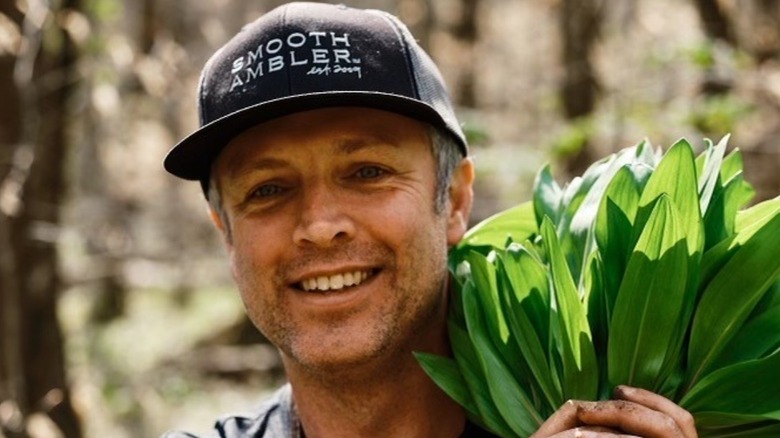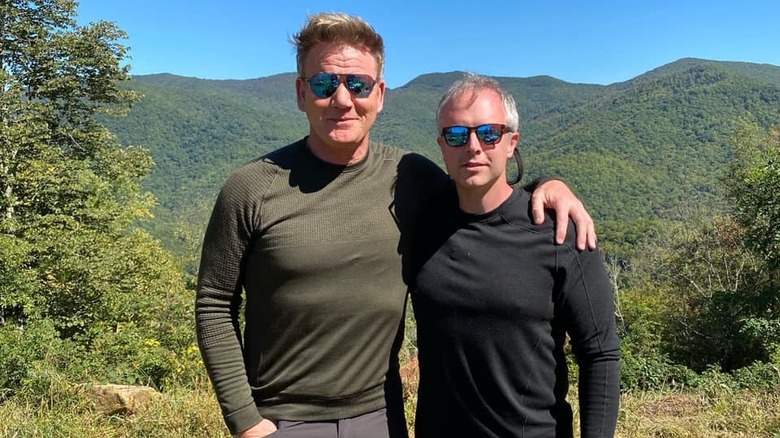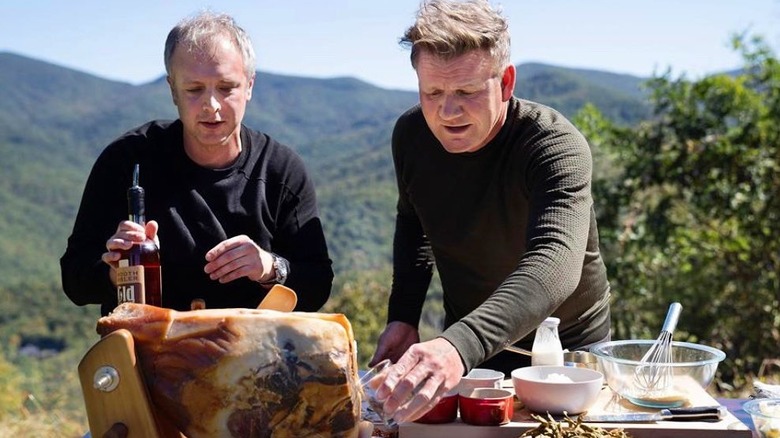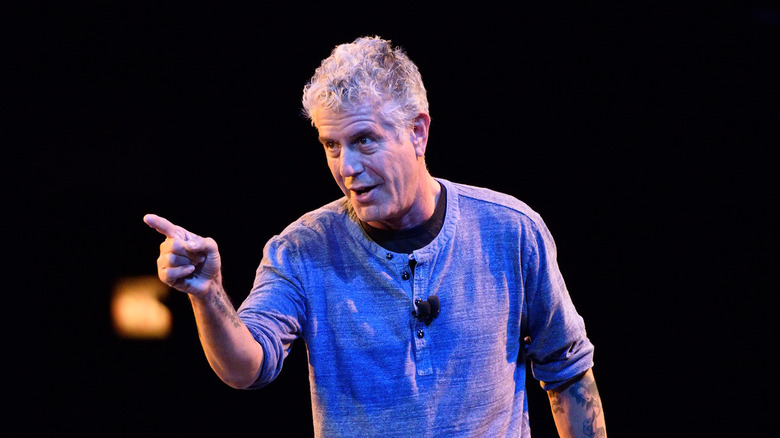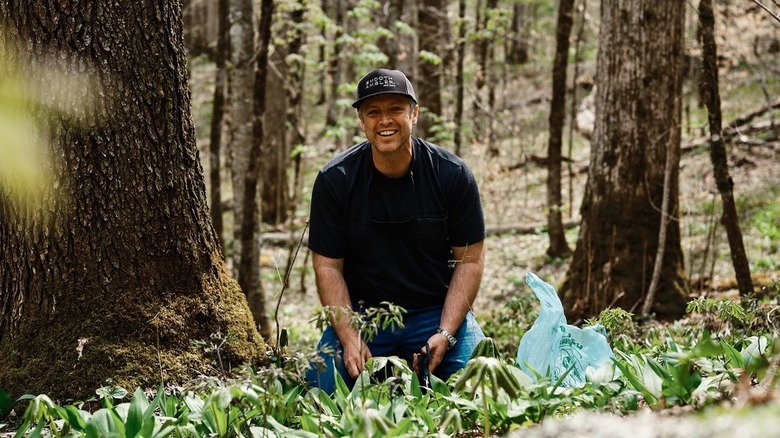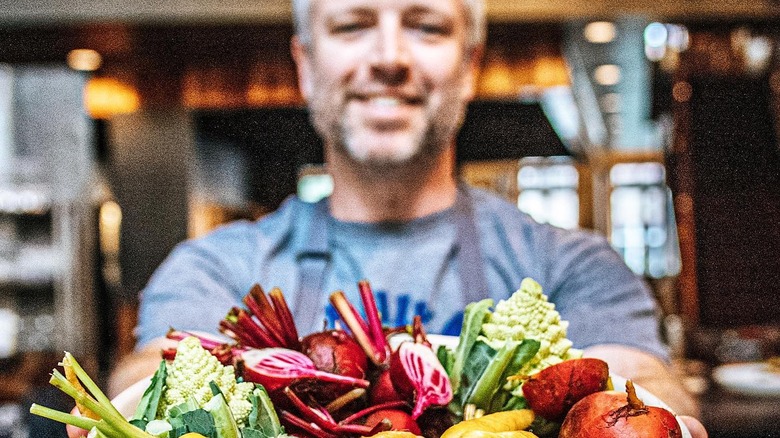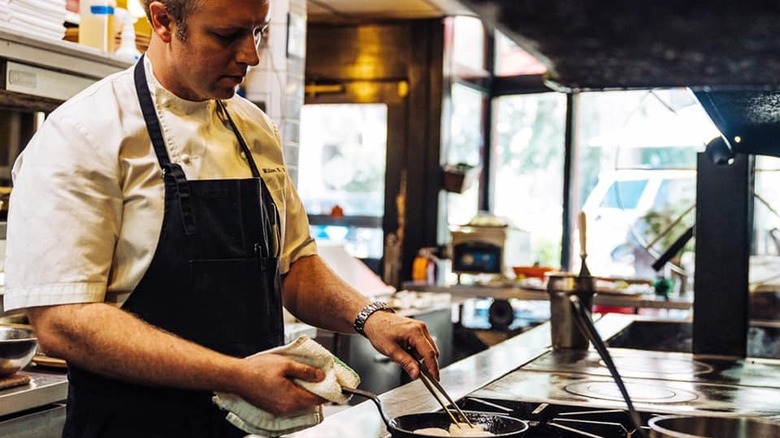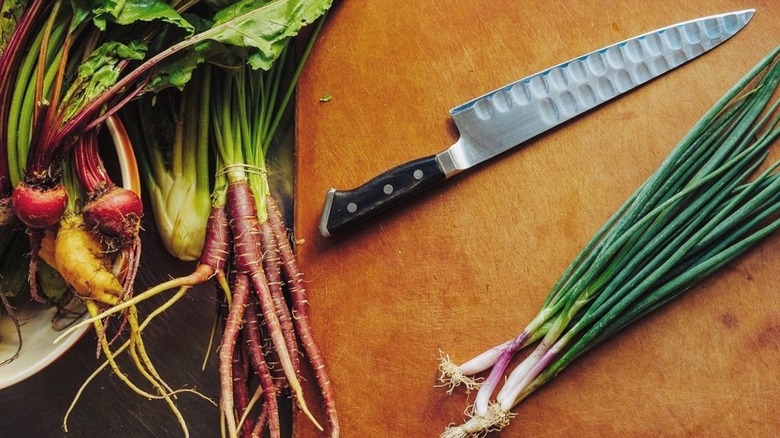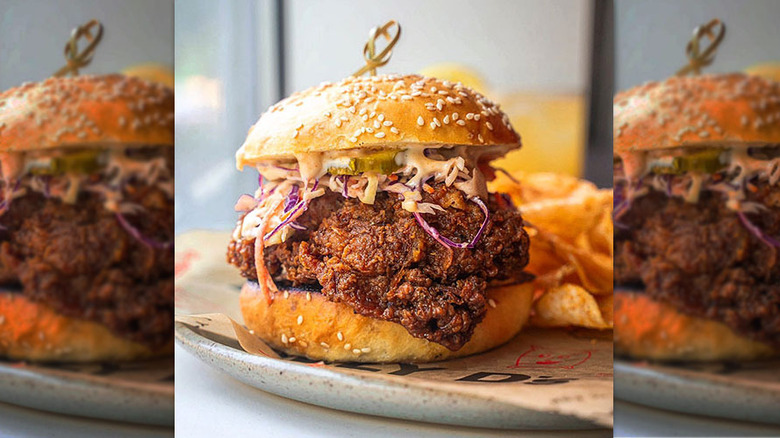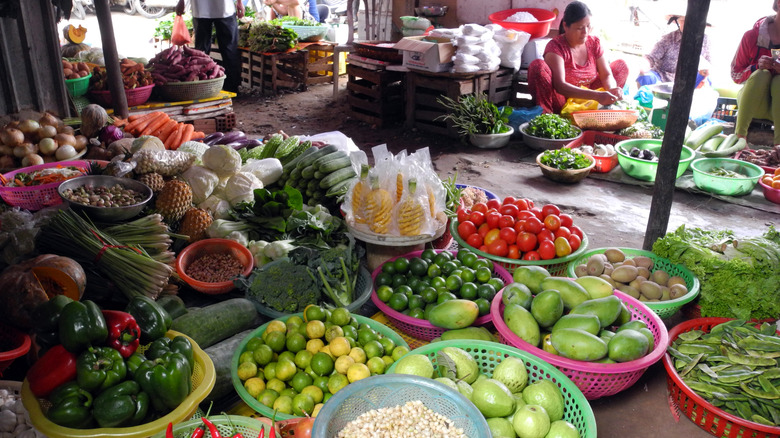Chef William Dissen Talks Gordon Ramsay: Uncharted And Farm-To-Table Food - Exclusive Interview
There are a few of the reasons you can rest assured that Chef William Dissen deserves that title before his name. More than a few, actually. For one, he graduated with honors from the Culinary Institute of America in Hyde Park, New York (this after earning a degree in French and English from WVU) then trained and worked under Certified Master Chef Peter Trimmins and Chef Donald Barickman, and then earned a Master's Degree in Hospitality from the University of South Carolina (via: Marketplace Restaurant).
Or you could look to the three distinct (and distinctly successful) restaurants the chef owns and runs, The Market Place restaurant in Asheville, North Carolina, Billy D's Fried Chicken in Asheboro, and Haymaker in Charlotte. You could look to his work with the U.S. Department of State's American Chef Corps or the fact that he is member of the Blue Ribbon Task Force for the Monterey Bay Aquarium's Seafood Watch. You could also simply look no farther than the fact that, on a recent episode of National Geographic Channel's "Gordon Ramsay: Uncharted," Dissen beat the vaunted multi-hyphenate Chef Ramsay in a head-to-head cooking challenge.
When Mashed caught up with William Dissen for a recent interview, the chef shared plenty about his time spent cooking (and foraging and fishing and generally hanging out) with Gordon Ramsay, he talked about what's right and wrong with the whole farm-to-table movement these days, and had plenty so say about the culture and cuisine of the Appalachia, his native territory.
William Dissen talks cooking with Gordon Ramsay on "Uncharted"
What were the most surprising parts of working with Chef Gordon Ramsey on "Uncharted"?
It was a pretty amazing experience. He's known as one of the most famous chefs on the planet. So to have the opportunity to work with him was definitely an exciting opportunity in my career. And Nat Geo — working with them also was amazing. As a child, I used to have a subscription to Nat Geo, so being able to be part of their TV series, "Uncharted," was kind of a feather in the cap, so to speak. It was really great too, to bring Gordon and bring Nat Geo to our region of Appalachia here in the Smokey Mountains to show them around.
This region really gets kind of a rap for being backwoods and dueling banjos country, but really has an amazing food culture and just history and heritage here. And I think that's something that Chef Ramsey saw when he was here, and we had a lot of conversations about the culture and the food, and he even made an analogy and said: 'I feel like this is such an untapped region.' He said: 'The heirloom ingredients and the heritage cooking [are] on par with places like Tuscany, Italy,' which to me was a pretty astounding comment.
What were the most enjoyable and what were the most challenging parts of the production?
Enjoyable, well, it was pretty cool to be considered an ambassador for the food scene here in North Carolina, to have that opportunity to kind of showcase the food on behalf of the state, the region, was pretty spectacular. Obviously, we filmed in the middle of COVID. So that was pretty tough with the daily COVID testing and all the COVID restrictions, but being outside most of the time it was a really nice opportunity to get out in the region without a lot of people around, a lot of tourists around.
What Chef William Dissen cooked vs. Chef Gordon Ramsay
What did you cook for the win against Gordon?
Well, we cooked a number of dishes against each other. So the premise of the show, is that I'm kind of the culinary ambassador for the show, we meet up, I talk to him about the region and the heritage and then send him on some adventures. And he meets a few folks along the way to learn about the culture and learn about different ingredients, and he brings some of those ingredients back with him to cook. Then we go and head-to-head in the cook-off. I cooked a mountain trout with candy roaster squash. We cooked leather britches, so that's an heirloom type of bean here from Appalachia called a greasy bean that we actually string and dehydrate, as a preservation technique, and then we later rehydrate those and cook them and it creates this really crazy umami bomb when you cook them. So we made leather britches, I did a forage hen with a wood mushroom gratin, and then we did griddle cakes, a cornmeal griddle cake with a sour corn and crawfish relish."
How is the camera and outside different than working in a kitchen on a normal given day?
I'm fortunate to have done a fair amount of TV in the past, and I do a lot of cooking demonstrations and guest chef events, and speaking engagements, so it's becoming kind of old hat at this point. But certainly different in that in a kitchen you never know what's going to happen. When you're cooking outside, you never know what's going to happen with the elements, or let's say, if you're cooking over fire, how that's going to change while you're cooking. But I think it's great. You're outside in touch with nature.
The other celebrity chefs William Dissen wants to cook with
Who is another celebrity or award-winning chef you'd like to cook with?
Oh gosh. There's so many great people out there. I'd love to cook with Alice Waters from Chez Panisse in Berkeley, California. She's kind of the farm-to-table guru and somebody that I followed for years. I think another celebrity, who's deceased now, but Anthony Bourdain is always somebody I've wanted to meet in person. Obviously, that's never going to happen, but his travels and cooking were definitely an inspiration to me along my career.
Would you want to cook with Gordon Ramsay again?
Oh, for sure. Yeah. It was an amazing opportunity. He's got a number of Michelin stars, he's a super famous chef, and his food knowledge is vast. So having the chance to kind of soak up some of that was really, really fun. [And] he's got this act that he's this larger than life personality when you watch the shows like "Hell's Kitchen," but the guy was one of the nicer people I've ever met, very down to earth, very considerate, took a lot of time, even though he is this vast celebrity to hang out and just get to know me, which was wonderful.
I think one of the big takeaways from the show for me was having Gordon come out and say you're one of the best chefs in the country, one of the most sustainable chefs on the planet. I'm not one to necessarily tell my own accolades, but that was something that really blew me away. And I think for me was kind of a pat on the back for myself and my colleagues at our restaurants, all the hard work and really what we're doing in terms of local sourcing.
William Dissen talks Appalachian cuisine
What do you wish more people knew when it comes to Appalachian cuisine?
I was born and raised in West Virginia [but I] kind of traveled all over the world, learning, educating, and I found myself back in Appalachia and Asheville when I started The Marketplace about 13 years ago. I think a lot of people think that we're all rednecks that are up here, all dueling banjos and moonshine. But I think one thing that's really set our cuisine apart is that here in Appalachia, we have natural boundaries with our mountains. And so it's created this area that really has been — pun intended — uncharted and untouched. And because of that, we have a lot of heirloom and indigenous produce and fruit and wild ingredients that you don't find anywhere else.
This part of Appalachia is considered one of the most biodiverse places on the planet with flora and fauna and types of animals and reptiles that you only find in this region. So [it] really is a special place and it's a temperate rainforest part of the region. So we get a lot of rain, a lot of moisture. There's a lot of wild mushrooms. I've lived and traveled all over the world and I've never been anywhere quite like this. I love central California for the grower region, that's 11 months of fresh produce, but the quality of produce that we get here from the really fertile soil, the temperate environment, I think puts that to shame almost. It's really a beautiful place.
William Dissen on the farm-to-table movement
What are some misconceptions people have over the farm-to-table movement?
I think the phrase "farm-to-table" has become cliche and that everyone says they're farm-to-table. You see national pizza brands on commercials saying that they're farm-to-table. That to me is a little bit misleading. I really, to me, I think it's about a sense of place and community. We put seven figures or more a year from our restaurants back into the local community by sourcing the local fruit and vegetables, artisan ingredients. I think that trickle-down effect in the economy is real. You don't find that as much as you would in a big corporate world as you do in a smaller, independent farm-to-table style restaurant. And I think that sense of place is really burdened because of that.
How can people cook and eat more sustainably in their everyday lives?
I definitely think eating more locally and more seasonally. I always make the cliché analogy of, would you rather eat a tomato in June or January? I think that's informative. If you can take that idea about how to eat, your food is one, going to taste better, and two, you're going to have more vitamins and nutrients in the food you eat, because it is fresher, rather than having something that's picked under ripe and shipped across the world in off-season time.
How Chef William Dissen can tell a restaurant is managed well
What do you look for when you're judging how well-run a professional kitchen is and are there red flags at a restaurant and kitchen not run properly?
When I'm going in as a guest chef in other folks' kitchens, I definitely look for cleanliness, I look for organization and I look for people smiling. To me, happy cooks make happy food. And I think when you're in kitchens that might be very professional, but have maybe a toxic work environment, you can see it by the scowl across people's faces. When you come into a kitchen and they're prepping and maybe there's some light music playing and people are smiling and having fun, that translates into the food you eat as a guest.
What advice do you have for an aspiring professional chef?
I think a lot of people think they can go to culinary school and watch Food Network and think that they're going to become the next famous celebrity chef like Gordon Ramsay. I think in any profession, you have to work hard to garner accolades and get to the top. So a 40-hour work week is not necessarily the norm if you want to make it to the top. It takes time and perseverance and hard work to get there. And there's a lot of sacrifice also. I know over the years, I've definitely sacrificed holidays or time with family in order to make my business work.
Chef Dissen's favorite dish to serve (and the foods he's done with, too)
What is one dish that you never get tired of preparing?
We have a dish on the menu at our flagship restaurant, The Market Place, we make a homemade semolina pappardelle pasta, and we braise local lamb shanks in red wine and make a ragu out of the braised lamb shank, and with roasted local oyster mushrooms and campari tomatoes. And then in the springtime, we get a lot of wild ramps, we'll preserve the greens into a pesto that we will vacuum seal and freeze to have it for the entire year. And so we garnish the plate with a wild ramp pesto and locally grown arugula. And it's a very simple rustic dish, but to me, it kind of showcases the artisan nature of how we cook and the locality of how we source our cuisine.
Are there any dishes you would just as soon never hear mentioned again?
I think I'm over foams and gels and that whole era of tweezer food. I think that's fun to break out for a celebration, but I think people want food that they can relate to, food that's nurturing and food that's delicious. You want to eat with your eyes also, but at the same time, the food needs to be delicious and something that you can relate to. I think, and if the food tells a story of the region or of a place, it's going to taste even better.
William Dissen's secret for the perfect fried chicken
Your restaurant Billy D's is all about fried chicken - can you share any secrets to making truly great fried chicken?
Fresh is best. You always want to source locally, make sure you know what the poultry is being fed. But I think in technique, well, we do a quick brine on ours. We actually do a pickle brine. So it's very quick, like 20, 30 minutes. And then letting it sit in a refrigerator uncovered for a minimum of six hours, if not overnight, forms what's called a pellicle and [because of] that kind of outside the chicken gets a little sticky. And so at that point, when you go to dredge it to deep fry it, that breading sticks on. One of my biggest pet peeves when we eat fried chicken, as you cut into it and the breading just falls off.
Sustainability is a huge factor in all your cooking, correct?
I do a lot of work with the U.S. State Department. They have a program called the American Chef Corps, so I'll do a lot of international work going out and doing the culinary diplomacy around the world with different embassies to help promote American cuisine and sustainability. And so having the opportunity to kind of be a part of ["Uncharted"] and on a national and international stage to talk a little more about that sense of community and sustainability is [important]. I hope it's a good message to get across to people that it's not just about TV or about food, but there's a bigger message behind what we do. And sustainability is a big part of that.
The main culinary influences for Chef William Dissen
Aside from your own Appalachian upbringing and the real farm-to-table experience you would have at your grandparents' farm, not to mention some of the French influence that came from your studies, are there some types of cuisine that have played a major informative role for you?
There are, yeah. When I met my wife, she was working for the Clinton Foundation and was recruited to go to work in Hanoi, Vietnam, and I spent a few months over there with her prior to buying my first restaurant, The Market Place. And that experience being in Northern Vietnam really, I think, opened my mind up to being influenced — to travel and to food and culture and just the flavors that I hadn't had before. And also my wife is an immigrant from India. She's Hindu, Indian, vegetarian, married to an Irish Catholic butcher. So a little yin and yang, but that flavor profile and that building of flavors, that Indian cuisine really has imprinted upon how I cook too.
If you had never gotten into cooking, what do you think you might've done as your career?
When I started out, I had a biology scholarship and I had grand plans to become a radiologist and become a doctor, but that didn't happen. So here we are today, but I think business is something I've always been interested in. I started out as an entrepreneur at 10-years-old with the paper route and lawn mowing service. And I think I always had that knack for wanting to work for myself.
Check out new episodes of "Gordon Ramsay: Uncharted," Sundays on National Geographic, and follow Chef William Dissen's culinary adventures at @chefbillyd.
